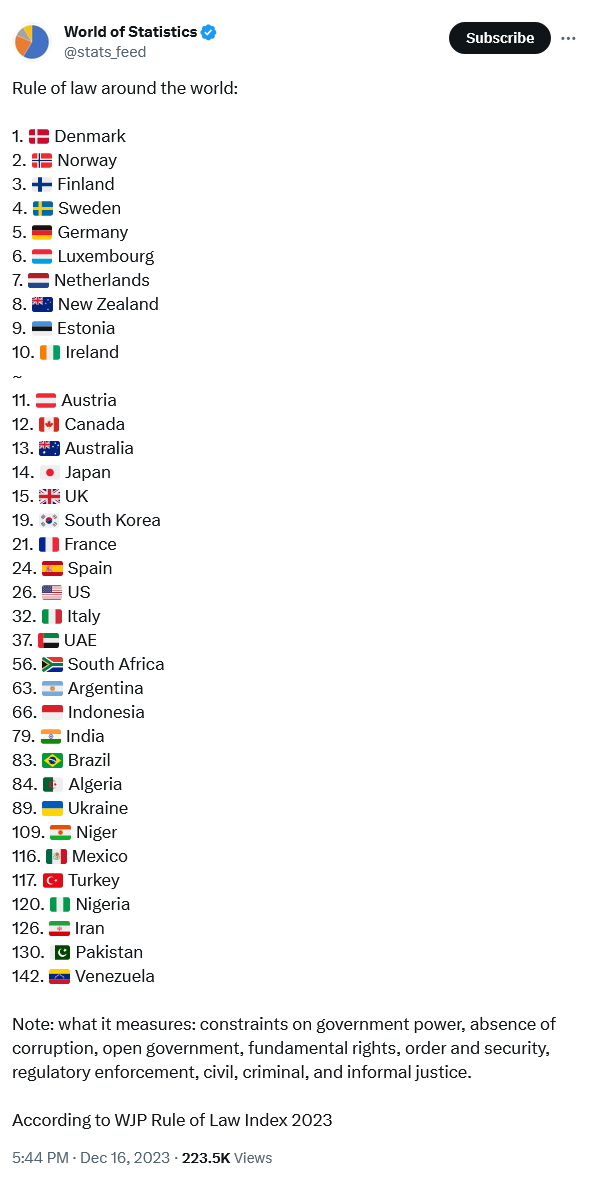The moral betrayal of Gaza
 |
| The destruction unleashed by Israeli occupation forces against the Jabalia refugee camp in northern Gaza. Photo: @QudsNen/X |
As airstrikes ravage Gaza, destroying homes and killing civilians, the Muslim world’s silence is distressing. While politicians voice rhetorical anger, actual action is lacking, leaving Palestinians to face a relentless military onslaught alone. This disparity between words and behaviour contradicts the ideas that are supposed to unify us.
The cognitive dissonance that has come to characterise Muslim-majority countries’ reactions to Israel’s prolonged assault on Gaza is startling. On the one hand, nations throughout the Muslim world have publicly condemned Israel’s conduct, offering professions of support for the Palestinian cause. On the other hand, these states continue to conduct diplomatic and commercial relations with Israel. This inconsistency reveals a deeper disease at the heart of our political institutions — one in which self-interest trumps humanity.
Double standards
How can nations claiming to support Islam and justice criticise Israeli brutality while normalising relations with the same state? This discrepancy is morally wrong and politically irresponsible. Saudi Arabia, the United Arab Emirates and Egypt, among others, have grown closer to Israel in recent years, despite Israel’s continuous occupation of Palestinian areas. For these regimes, practical politics has surpassed meaningful action to challenge Israel’s military might or assist Gazans.
This leadership failure is not only a betrayal of the Palestinian struggle; it is also a rejection of Islam’s core ideals of justice and human dignity. Governments that claim to promote these ideals must be consistent in their foreign policy, not just when it benefits their geopolitical interests.
Western powers frequently identify groups like Hamas and Hezbollah as “terrorists” in global narratives, and many Muslim-majority countries accept this name without question. Rather than confronting such depictions, these leaders prioritise political expediency and distance themselves from organisations that oppose Israeli occupation.
While contentious, Hamas is a prominent actor in the resistance against Israeli occupation, yet its methods and role remain highly disputed. Rather than confronting these realities, Muslim leaders have mostly chosen denunciation, agreeing with labels that free Israel of responsibility.
Geopolitical interests over morality
The relationship between Muslim-majority countries and Israel is frequently motivated by self-interest and the desire of economic or strategic ties. For example, the UAE’s decision to normalise relations with Israel in 2020 was driven mostly by shared concerns over Iran’s regional influence. Saudi Arabia, too, is rumoured to be moving towards similar normalisation. However, while these partnerships may benefit short-term political and economic interests, they have a heavy moral cost.
Muslim governments must question themselves: at what cost are these relationships made? Is it worth risking Palestinian lives for economic deals, defence accords or regional power plays? The lack of genuine pressure on Israel, or even the refusal to cut connections with the state, demonstrates a troubling prioritisation of political expediency over the lives of those living under occupation.
Former Egyptian President Gamal Abdel Nasser and former Pakistani President Zulfikar Ali Bhutto exemplified pan-Islamic sympathy with Palestine some decades ago. These leaders took strong positions against Israel, often at significant political cost. Today, such leadership has evaporated, replaced by governments more concerned with appeasing Western powers and protecting the status quo than with taking significant steps to alleviate Palestinian suffering.
The absence of leadership in the Muslim world is more than a political failure; it is also a moral failure. When Muslim leaders act in self-interest, disregarding the millions of suffering Palestinians, they violate the very ideals that should define their leadership. Declaring denunciation is insufficient; real action is required.
A call for grassroots mobilisation
In the absence of strong government leadership, ordinary Muslims must stand up. People who stand in solidarity with Palestine must put their words into action. This necessitates campaigning within families and communities, as well as sustained pressure on governments to implement policies that are consistent with the ideals of justice, dignity and humanity. It entails persuading governments to halt their role in Israeli apartheid and to provide meaningful support to the Palestinian people, rather than merely hollow promises.
Beyond political activism, there are several avenues to provide actual aid to the Palestinian people, including humanitarian organisations and grassroots groups. The global Muslim community must mobilise, not simply in solidarity, but also in action. We must hold our leaders accountable for their inaction while simultaneously acknowledging that we have the ability to make a change.
Palestinians face not only Israeli aggression but also the indifference of Muslim-majority countries. The hush must stop. Leaders and grassroots activists must work together to pressure governments to end their complicity and stand firm for justice. Gaza’s survival, as well as the moral integrity of our global community, is at stake. Cognitive dissonance must be resolved.
The Muslim world must make a choice: will it continue to sell its soul for political gain, or will it stand firm in defence of justice, humanity and the ideals that Islam so dearly cherishes?
Now is the time to speak up and act. Gaza’s survival is dependent on the courage of Muslims worldwide to stand up and demand a better, more just world.
[Syed Salman Mehdi is an IT specialist and political analyst who studies international relations, geopolitics and social justice. He has written extensively on global issues, particularly those impacting Muslim-majority countries.]
Showcase of Published Articles by Syed Salman Mehdi
Explore my body of work, featuring articles published in renowned platforms across the globe. Delve into a range of topics, including geopolitics, social issues, and more. Below is a comprehensive list of my published articles.
Green Left Weekly 🌍
Moral Betrayal of Gaza Published in 2024, this piece explores the moral implications of global indifference towards Gaza’s plight.
Paradigm Shift 🕊️
Geopolitical Chess: Analyzing the Global Power Play A 2024 article dissecting the intricate strategies of global powers.
Sugarcane Production in Pakistan: Challenges and Opportunities Examining the socio-economic impact of Pakistan’s sugarcane industry in 2024.
Global Voices 🌐
A Reactive Approach: Examining Pakistan Government’s Measures in Response to Alleged Umrah Visa Abuse Published on December 22, 2024, this article evaluates Pakistan’s reactive policies to visa-related controversies.
CounterPunch 📰
Switzerland’s Burqa Ban: A Crossroads of Freedom, Identity, and Social Cohesion Published on January 3, 2025, this article navigates the complex socio-political dimensions of Switzerland’s burqa ban.
HumSub (English) ✍️
The Lost Children of Sindh: A Growing Horror A harrowing account of child trafficking in Sindh, published in 2024.
Labour Laws & Social Security Systems: The Dilemma of Forgotten People Highlighting systemic challenges faced by workers in 2024.
HumSub (Urdu) 🇵🇰
سال 2024 : انسانیت کے زوال کی داستان Reflecting on humanity’s decline in 2024.
معاشی زوال بذریعہ موروثی کمال Analyzing economic decline through hereditary politics in 2024.
مشرق وسطی اور کردوں کا مستقبل Delving into the future of Kurds in the Middle East, published in 2024.
About the Author 🖋️
Syed Salman Mehdi is a freelance writer and researcher, dedicated to uncovering nuanced perspectives on global and regional issues. With a flair for storytelling and a commitment to truth, he has contributed to leading platforms such as Green Left Weekly, CounterPunch, Paradigm Shift, and HumSub. Salman is passionate about sparking meaningful conversations through his work.
For freelance or ghostwriting enquiries, feel free to get in touch or visit my latest blog for updates and insights!











